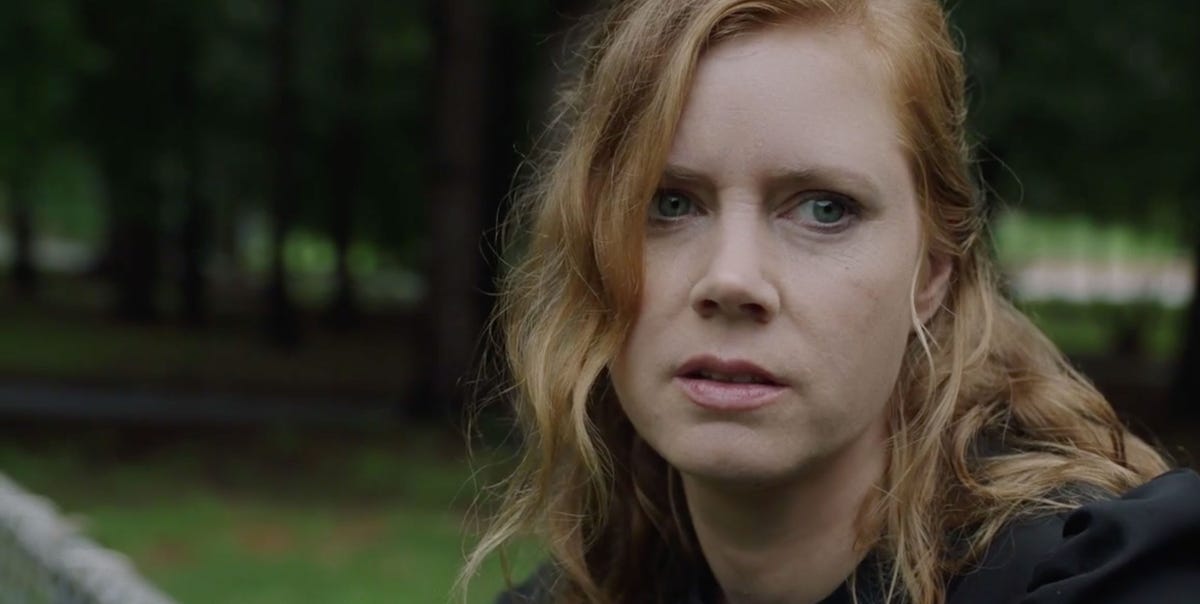

Warning: Spoilers for Sharp Objects season 1, episode 2 “Dirt” ahead.
Advertisement – Continue Reading Below
Slow moving, unnerving, and completely addicting, Sharp Objects is a visceral wound audiences can’t help but pick at, attempting to dissect every menacing Wind Gap interaction even before they have nearly enough information. We’re thirsting for information and the key to the HBO series’ many mysteries, from the identity of the killer to what the hell is up with Amma (Eliza Scanlen)—Are her personality shifts completely an act? Is she the killer?—much more than protagonist Camille Preaker (Amy Adams) does, at least for now.
The Washington Post recently credited Gillian Flynn, the writer of the novel the new series is based on and the second episode of the series, for “giving women permission to be bad” and giving us a narrative that pushes against “this idea that women are innately good, innately nurturing.” Camille—an acerbic alcoholic who did actually say, “Let’s hope we find a dead little girl” to her editor—is indeed abrasive, though also somewhat sympathetic (mostly thanks to her batshit mother and flashbacks to her dead sister), and I have to squeeze my eyes shut every time she sticks a pin underneath her fingernails….but can we also talk about how she’s bad at her job?
In episode 1, when Camille tries to argue she won’t “win a Pulitzer for Wind Gap,” her editor, Frank (Miguel Sandoval), tells her she won’t win a Pulitzer because she’s “only half good at writing.” Well, it seems like she’s only half good at the reporting part, too. This is not a dig at Sharp Objects. Hollywood loves the “flawed genius”—a trope that boasts almost exclusively male examples. Think of a character who drinks away their liver at all hours of the day, suffers from unacknowledged depression, and has deep-seated anger issues, yet somehow remains at the top of their field—you can probably name ten. It’s surprising to see someone’s flaws and poor choices actually hinder their performance…you know, like in reality.
Advertisement – Continue Reading Below
In episode 2, Camille’s professional judgment definitely seemed a little impaired. Here’s every time I questioned her “journalism.”
1. She’s drinking…like, the whole time.
2. When she chose an odd place to sit during the funeral. Okay, so this isn’t necessarily poor journalism, but it’s certainly in poor taste to sit in the second row and take notes during a service for a child. Why she wouldn’t sit further back? It could have to do with wanting to watch the reactions of those closest to the child…so maybe I’ll give it to her. She does seem to be focused on Natalie’s brother, who has a pretty non-alibi alibi for the murders: He was “driving.”
Advertisement – Continue Reading Below
Advertisement – Continue Reading Below
3. When she left the funeral before anyone else. When your goal is to observe, you should make yourself as invisible as possible. Leaving the funeral while the priest is leading a prayer (especially when you’re sitting in the second row) does the opposite of that. Her quick exit did seem to be sparked by a flashback to her sister’s funeral and the disturbing image of her mother pulling out her own lashes—troubling events that would affect anyone—but they might be another marker that she’s too emotionally compromised by her unaddressed trauma to think straight about this story.
4. When she didn’t follow up on a promising lead. For whatever reason, Camille does not talk to the girl who says, regarding what Natalie’s mother said, “That girl she describes was not Natalie. Believe me, I should know.” Camille’s mood at the wake is apathetic at best. Throughout episode 1 and 2, unexplained words pop up all over the place, and they seem to reflect Camille’s state of mind, mood, and thoughts. During the wake, here’s the word catches her eye:
Advertisement – Continue Reading Below
5. When she searched the girl’s room without permission. In the words of Adora (Patricia Clarkson), “You can’t just go into the room of a dead little girl.” And she left her drink in there like a flighty sorority girl at a frat party.
6. When she talked to a child without parental consent. In a town currently on edge over the abduction and murder of multiple children, Camille thinks it’s a great idea to go up to an unaccompanied minor and ask him about it. Oh, and when he tells her about another child who was with Natalie when she disappeared—taken by a “woman in white”—she asks him to bring her to him. Hasn’t she heard of stranger danger?
7. When she lied to her editor. The number one no-no. She tells him she had permission to be in Natalie’s room after he rightfully points out that it would be a breach of ethics otherwise. Actually, he said they’d be “screwed” if that was what she did. Oh, well.
Sharp Objects airs Sundays at 9 P.M. EST on HBO.

Be the first to comment